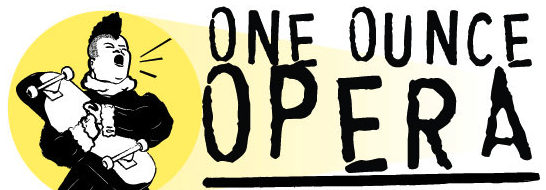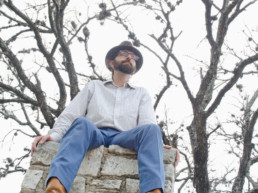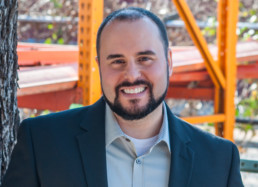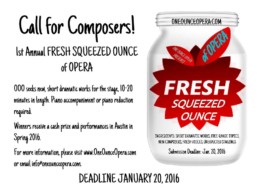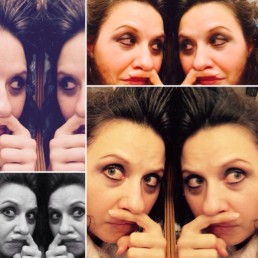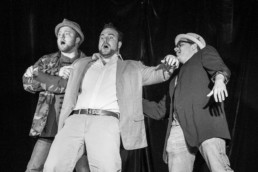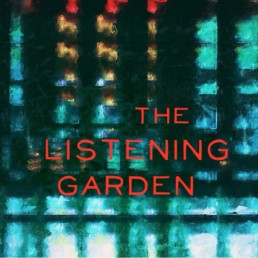Meet Jeff Luna, Winning Composer of FSOO 2016
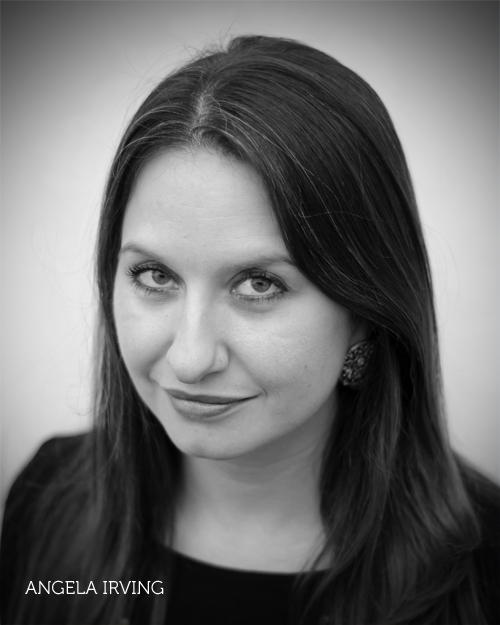
This is the third in our series of composer spotlights previewing the Inaugural Fresh Squeezed Ounce of Opera, April 15, 16, 2016.
Meet Austinite Jeff Luna, whose winning short comic operetta Love After the Collapse of Civilization will have you swiping right, and wondering about where we might really be headed.
OOO member Angela Irving conducted this interview.
Be the TITLE SPONSOR for Love After the Collapse of Civilization!
1) What inspired you to write Love After the Collapse of Civilization?

I was inspired to write Love After the Collapse of Civilization after dating on sites like Tinder and OkCupid and seeing how strange the reality of dating has become, and how that reality has become the new normal. And in the future, when our grandkids are telling us about how complicated dating has become what with all the telekinesis and mind-melding, we’ll be telling them how simple it used to be, when we would just push a button on someone’s picture to tell them we liked them. Also, post-apocalyptic stories are fun to write, so I decided to make an operetta about a nostalgia for 2016-era dating in a primitive society after the world more or less ended.
2) I love how you chose to break the 4th wall in LACC! Why/how did that device strike you for this piece?
In any story that happens after the end of the world, there’s a ton of backstory that needs to somehow be revealed. The only way I could imagine having this backstory be revealed was through the main characters to an outsider. In this future there’s only about 200 people, and they all know very well just what happened, so the outsider would have to either be an extraterrestrial, a time-traveler, or a last-minute emergency interpretive narrator. I chose the latter, which necessitated breaking the 4th wall.
3) Looking at your website, it looks like you’re heavily involved with a bunch of different genres of music, from classical to rock to commercial music — was this your plan?
As a professional composer without a music degree, I take whatever jobs I can get and try to give my clients whatever they want, even if it’s in a style I’m not familiar with. This involves a lot of musical cramming and approximation of various genres, but it’s worked so far, and as a result I have lots of tiny genre fragments in my head that come in handy when I’m writing.
4) You’ve written a lot of scores for films, and even won some awards for them! — Will you talk about your process for writing music for other people’s existing art works and your process for creating your own?
With film scores, the director has often already made up their mind about the exact feel of the music they want in each scene. The challenge is to translate adjectives like “dark,” “ominous,” “cheery,” or “hopeful,” into musical passages that meet the director’s expectations. I’m not a very good mind reader, so usually it’s a matter of trial and error, and can be frustrating, but the end result is that I end up writing more music than I would have otherwise, which is awesome. The process for creating my own pieces is the same as the process for writing for others, but trying to figure out what it is that I want and what I’ll ultimately be happy with can be more difficult than working with a picky director.
5) As a member of Minor Mishap Marching Band, a group that brings brass band music to the streets of Austin, TX, and a member of/composer for the late Sound Bridge Project, a group that sought to bridge the gap between classical music and the general public, where do you feel the future of classical music and the general public (especially of Austin) is going?
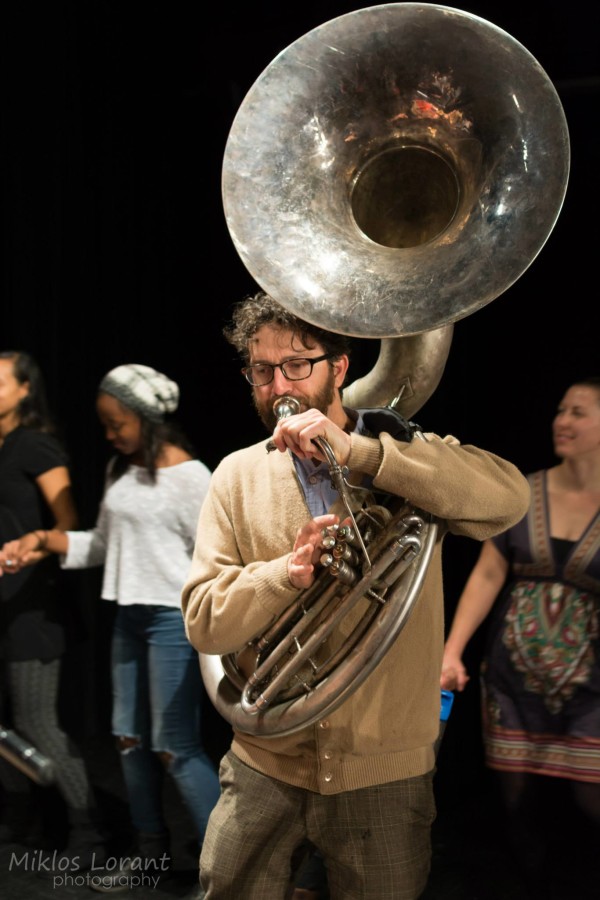
A 25 piece costumed brass band playing upbeat catchy music will always have an audience. Minor Mishap can be subtle too, and we do it well, but we have to gauge the audience first, because a lot of times they’re expecting loud and audacious. The Sound Bridge Project was very successful at bringing classical music to a public that might not experience it otherwise, in listening rooms such as Flipnotics or the Vortex Theater. However, in other venues we would encounter the same problems musicians in every genre experience in Austin, where the music is relegated to the background and you’re performing amongst chatter, large televisions, and other audience distractions. Loud amplified music can cut through the chatter and it doesn’t affect the performance much, but a delicate classical piece is quickly drowned in that atmosphere. The success of a classical music performance is hinged on people paying attention - there’s a lot of interesting things happening in the harmonies, counterpoint, and rhythm that you’re going to miss if you’re in the middle of a conversation. I think it should absolutely be performed in unconventional spaces, but only if the audience understands that they’ll enjoy it a lot more if they pay attention. We need Alamo Drafthouse style warnings before performances - DON’T TALK OR TEXT OR WE’LL KICK YOUR ASS OUT.
Jeff Luna is a composer, arranger, engineer, producer, music director, and musician. Mr. Luna has composed and arranged original scores to documentaries, feature films, plays and musicals, documentaries, a short opera, and has also written songs and music for international PR firms and advertising agencies. In addition, he has over 14 years experience recording and producing music of many different genres.
Meet Liam Wade and John Grimmett, Winning Composer/Librettist Team of FSOO 2016

One of the five chosen shorts for the Inaugural Fresh Squeezed Ounce of Opera harkens back to the days of vaudeville. Part of the Act will receive its regional premiere on April 15, 2016 in Austin, Texas.
BECOME THE TITLE SPONSOR FOR Part of the Act!
To get to know them better, OOO Member Maureen Broy Papovich recently discussed Part of the Act with its creators, Composer Liam Wade and Librettist John Grimmett. Maureen, who will be taking on the role of "Ginger Taylor," had these questions for this winning team:
1. For John and Liam: my character, Ginger Taylor, is a seasoned actress with a complex history. The situation she in which she finds herself is timeless. How did you decide on this story for an opera? Is the character of Ginger Taylor based on any actress in particular?
John: Liam and I went back and forth on a couple of ideas, everything from original stories to adaptations. We settled on a short play we both liked by the Hungarian playwright Ferenc Molnar (who is most famous for his play Liliom which Rodgers and Hammerstein adapted into Carousel) called A Matter of Husbands. We were both drawn to the humorous ironies within the play -- we found them timeless, too.
I proposed we move the time and place to a 1920s vaudeville house, where "show business" was born, and then we gave names to the characters (Molnar had them notated as "Famous Actress" and "Earnest Young Woman.") I think Ginger Taylor is an aggregate of many different types of comic actresses we think we know -- Fanny Brice, Ethel Merman, Barbra Streisand, Liza Minelli (or, maybe, Minelli's portrayal of Sally Bowles from Cabaret is most accurate), etc. She is a complicated character, and I hesitate to say she is an archetype or a stock character, though it's easy to typify her in that way since she is in a "musical comedy." I never set out intending to create her as an imitation of anything other than who she is -- and I think Liam succeeds in giving her some really indulgent music. That's who she is, after all.
Does she feel sorry for Mabel? Maybe. Does she really love Seamus? Probably not. But in both cases, I think she loves making you think she does, and that's truly what she loves the most.
Another note: not every composer can write "funny" music, and many people think "funny" music does not exist. Liam, however, has created a score that re-contextualizes the musical jokes that we all love in Looney Tunes. What I love most about Liam and his music is that you have a composer who clearly understands Brahms and Wagner and the masters of classical music and who has a very funny sense of humor. Those two things -- an awareness of craft and one's self -- are necessary when writing a farce, and I think that's why this piece continues to speak to audiences.
2. For Liam: Are there different aspects and qualities of the music you use to capture qualities of the characters?
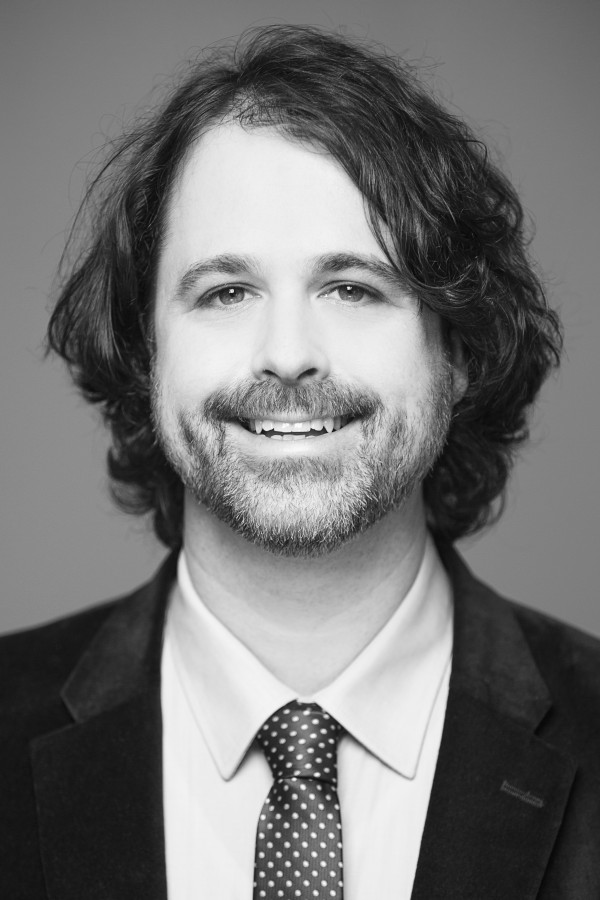
Liam: A big musical influence on Part of the Act was the early Disney and Warner Bros. cartoon scores by Carl Stalling. His scores were often a patch-work of musical references mixed with his technique of "Mickey Mousing" the actions of the characters with musical sound effects. This approach has its roots in vaudeville and the music a pianist or organist would play in the theater accompanying a silent film.
John created some three very dynamic characters, each with lovable and deplorable qualities. In that way they felt very real to me. It was clear that Ginger was a showoff, so I took her into a Queen of the Night/ "Glitter and Be Gay" direction. Mabel needed to work on her self esteem, so I gave her some "Trouble in Tahiti" and Electra moments. And Seamus is the sweet talking Irish Bari-tenor who's completely in love with himself.
There is a lot of physical comedy in POTA, so as I was acting out the libretto in the music, the piece really took on an authentic vaudeville-slapstick feel. The idea to really play up the slapstick was also something I got from talking to my great aunt Maureen Wade who remembered seeing vaudeville shows as a child in the 1920's. Another thing I really like about John's libretto is how fast it moves. It's a very quick 20 minutes, and that really helped me find the comedic timing. John recommended that I watch Looney Tunes too.
There is a coolness about Ginger Taylor, but she's also a trouble maker. I always thought of her like Bugs Bunny. Along those lines, the role Mabel McGinley is a bit like Elmer Fudd. Gullible and gunslinging. We sympathize with her, but she might actually blow someone's head off. Ginger and Mabel kind of play out a role reversal of antagonist and protagonist, like Bugs and Elmer in "What's Opera, Doc?", or any other Bugs and Elmer cartoon.
And the husband, Seamus McGinley... I initially though of him as pretty simple like Steve Martin's character in "The Jerk". Working with tenor John Packard on the studio recording helped me realize that there is a real sliminess to the role, like Nick Apollo Forte's character in Broadway Danny Rose or Michael Caine's character in Hannah and Her Sisters. Woody Allen's casanovas are always such jerks.
3. For John: I noticed that you have authored both lyrics and composed music for different pieces, much like Stephen Sondheim. As a librettist, does the fact that the story will be set to music affect your words? Do you have ideas about how the music should sound?
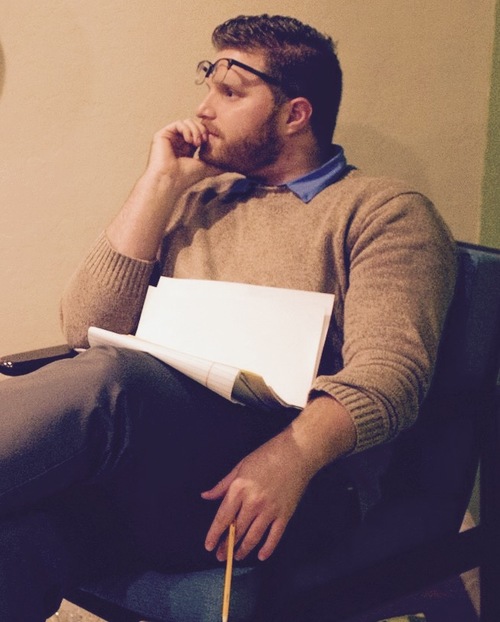
John: A good librettist understands music and its function in an opera. I happen to write both music and words, so I feel like I'm at an advantage than, say, a playwright or a poet who attempts libretto writing without a clear concept of how music functions dramatically. My teacher, Edward Albee, considers himself a composer over a playwright because he attempts to compose music with language. I aspire to the same, and I think my musical training in composition and orchestration have been incredibly useful in this regard. That said, I've never considered myself a composer who writes dramatically; instead, I feel like I am a playwright who happens to write music, much in the same way some actors are actors who happen to sing rather than singers who happen to act.
The words in an opera have to inspire music and serve as a vessel for the music to create dramatic subtext. Otherwise, the entire thing becomes too muddy and convoluted -- if a play is a perfectly good play or a poem a perfectly good poem, why need it be set to music if the emotional response garnered from the play or poem has already created a unique experience? I argue that music has little to add, at that point, since the literature seems to possess a music of its own. I believe some of the great librettists of the 21st century -- people who have influenced me like Gene Scheer or Deborah Brevoort or Royce Vavrek or Donna DiNovelli or Mark Campbell -- strive for balance. No longer do we believe that a libretto is a skeleton upon which hangs a musical flesh; instead, we strive to balance a work of literature on its own merit against being a vessel for musical drama. It's very difficult thing to do, but when it's done right, the audience has a transcendent experience.
Technically, a librettist must understand rhythm in all aspects, both musically and dramatically. There are dramatic beats when things happen in an opera (versus a song cycle, when poetry captures a bit of the mundane and makes a single moment extraordinary), and there are musical beats that put the story and characters in the spotlight. How one makes this happen, rhythmically, is similar to how an artist decides what medium she should use to create a work of visual art. I paint with words, so should this moment, rhythmically, be a lyric with a structure? Is that how I'd like the drama to land? How will I parcel out the story that way as opposed to using something freer in terms of form? Does the content (the characters, the story, etc.) demand this? Sondheim, as you mention, masters these things, and I'd like to think it is because he understands rhythm as both a musical and dramatic fundamental. Read the lyrics to "Someone in a Tree" from Pacific Overtures and see for yourself how rhythm is paramount to the librettist.
It's hard for me to talk about my own work because I can only comment as an observer (meaning I'm not sure any of these ideas I have about writing are active choices as opposed to an instinctive ones). I think I will always have my musical ideas with the libretti I write with other composers, and while we certainly discuss those ideas during the writing process, I celebrate the composer's unique voice on whatever piece we are working on together. There is a reason I make things with the composers I make things with: I find them fascinating, complex people, so I don't ever try to impose my own opinions too much and disrupt the black magic that goes into making something new. In fact, I feel that they are so brilliant that, selfishly, I am inspired to steal from them as I develop my own musical voice -- that's my only motive.
4. For Liam: From your website, it seems most of your compositions are for smaller ensembles and soloists. What factors have led you to write for smaller groups and ensembles? Do you have an interest in compositions for larger ensembles?
Liam: I write for soloists and smaller ensembles because I love to hear my music performed! The only reason I haven't written more for larger ensembles is that it's not very practical. I think it's very important for a composer to write many, many pieces and have the chance to hear them as often as possible. That is the way a composer develops his/her own voice.
Also, writing for singers is what really inspires me. My music is driven by words. Poems and lyrics are often written in a singular voice, so the music comes out that way. However, I love the combination of voice and orchestra and plan on writing many operas and song cycles with the full Monty as well.
Find out more about Wade and Grimmett by visiting their websites. Below are short bios of each.
###
LIAM WADE was the 2015 recipient of the Wagner Society of Northern California William O. Cord Memorial Grant Fund. He was also recently awarded the 2014 Boston Metro Opera Festival Award for his opera, Part of the Act; and the San Francisco Friends of Chamber Music 2014 Musical Grant Program Award for his song cycle, Full Fathom Five. This spring he will write a new piece for The Atlanta Opera’s 24-Hour Opera Project.
His chamber opera, Part of the Act, was commissioned by Washington National Opera and premiered at the Kennedy Center on their 2012-13 season. His music has been championed by singers who include sopranos Lisa Willson, Emily Dorn, Ann Moss, Heidi Moss, Jennifer Piazza-Pick and Shantelle Przybylo, mezzo-soprano Julia Mintzer, tenor John Packard and baritone James Shaffran.
His music has been heard on concerts at La Jolla Music Society, ProQuartet France, Toronto Music Garden, West Edge Opera, Academy of Vocal Arts, The Kennedy Center and Semperoper Dresden.
He recently worked with the Lee Trio on a new piece that premiered on a recital at Philadelphia’s Academy of Vocal Arts last October, and with librettist Caitlin Vincent on a new song cycle for soprano, cello and piano titled Love in the Time of Email that premiered on the same concert. Last June, tenor John Packard and pianist Markus Pawlik premiered Wade’s dramatic scene for heldentenor, The Eve of Waterloo, based on a poem by Lord Byron, on a recital presented by the Wagner Society and the Consul General of the Federal Republic of Germany. For the last two year’s Wade’s music has been performed on Semperoper Dresden’s Semper Soiree series.
Wade studied composition with Philip Lasser, Howard Frazin, Kurt Rohde, Ross Bauer and Jake Heggie. His musical interests range far beyond the opera house as he can regularly be heard performing Jazz, Rock and Country.
###
JOHN GRIMMETT (b. 1988) is a composer-lyricist, librettist, playwright and poet.
His work has been performed internationally by such theatre and opera companies as the Washington National Opera, Fort Worth Opera and the Baltic Chamber Opera Theatre as well as at universities and conservatory training programs at the University of Houston, New York University and Indiana University, among others. The composer of musical theatre and art songs as well as solo instrumental, chamber, and choral works, Mr. Grimmett is the recipient of the 2014 Festival Award in Opera from the Boston-International Contempo Festival for Part of the Act and the 2015 runner-up for The American Prize in Composition (Opera, Theater and Film Division) for Rain Down the Ruin.
Mr. Grimmett’s mentors include Edward Albee, Jake Heggie, and David Ashley White. He also studied at the Graduate Musical Theatre Writing Program at New York University, where he was a recipient of the Max Dreyfus Scholarship from the ASCAP Foundation in recognition of his talent as a musical theatre composer.
His most recent collaborations include Rain Down the Ruin, a musical with 2015 Kleban Prize finalist Jason Carlson; an arrangement commissioned by Ann Moss for Chanticleer on Moss’ upcoming album, Love Life; and a viola sonata for violist Justin Ouellet. He is also writing the music and words to the children’s opera, Henry the Steinway (based on the children’s books of the same name); the libretto for Nothing in the Nothingness, a chamber opera with music by Daniel Zajicek to be premiered in Houston in February 2016; and the libretto for The State of Jefferson, an opera with music by Kenneth Froelich and commissioned by the Fresno State Opera Theater for their 2016-2017 season.
In addition to three new operas, upcoming works include Regrets Only for soprano Ann Moss and cellist Emil Miland; Finite Differences, a song cycle with Kenneth Froelich for soprano Ann Moss and the Hausmann Quartet; and a commission by the Alvin Junior High School Symphonic Band for the dedication of the school’s new band hall.
During the academic year, Mr. Grimmett directs a junior high theatre program in the Pearland Independent School District (Pearland, TX) and recently won first place in the 2016 Pearland ISD Junior High UIL One Act Play Competition. He is also a teaching artist for the Red Door Theatre Company (Pasadena, TX) and the Director of Educational Programming for CMASH, a new music repertory group dedicated to establishing long-term collaborative relationships between composers and performers and welcoming new audiences to the genre of contemporary chamber music. When not teaching, he lives in New York City.
###
Meet Steven Serpa, Winning Composer of FSOO 2016
Meet Steven Serpa, composer of the winning short opera Thyrsis and Amaranth, which will be a part of the Inaugural Fresh Squeezed Ounce of Opera Showcase. And truthfully, the piece that started it all.
I (Julie Fiore) first met Steven in Austin over drinks about a year ago. He shared Thyrsis with me, and the idea to host a short opera competition began to swirl and clink like the ice in our glasses. I knew I wanted to bring T&A to life (oh, the puns!). I am so glad to have Steven as a part of this very first FSOO!
YOU OR YOUR BUSINESS CAN CHAMPION STEVEN’S DEBUT WITH ONE OUNCE OPERA. BE HIS TITLE SPONSOR!
Here are a few questions from OOO to Steven. You will find a full bio below his thoughtful answers. Enjoy!
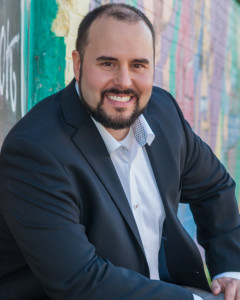 1) What part of your composition style/compositions do you feel is the most influenced by your unique experience as a countertenor?
1) What part of your composition style/compositions do you feel is the most influenced by your unique experience as a countertenor?
Well first off, my training as a classical singer comes out in the prominence of melodic lines in my compositions. Whether I am composing for piano or orchestra or whatever, a lyrical, singable line is strongly present. Being a countertenor specifically, I have had the chance to perform a whole lot of early music and have worked with and learned from leaders in Medieval, Renaissance, and Baroque performance. The music that really fascinates me uses modes instead of the major/minor scales classical music, and that has influenced my melodic and harmonic language immensely. To get a little dorky, I have a penchant for modal cadences of thirds rather than classical cadences of fifths. There is a duet toward the end of the opera that is in a sort of D major mode, and the harmonic progress ends with F-sharp minor to D major harmony, as opposed to a traditional cadence that would go from A major to D major. Another characteristic of my music that comes directly from my early music performance experience is my use of cross-relations, where a pitch of two different qualities would sound at the same time or in quick succession. So at the end of Thyrsis’ aria at the beginning of the work, he ends holding a C sharp in an A major chord, and then the piano quickly cadences to the B-Dorian/Phrygian mode mixture I’d been playing with. Thyrsis is sustaining his C sharp, the piano creates a harsh dissonance by hitting C natural against it. This collision of pitches is built into lyrical melodic lines that disguise their conflict, but it creates an affect for the listener of things not being settled, of things not quite joining together. In Thyrsis & Amaranth, these cross-relations hint that the love story isn’t going to work out so well for Thyrsis as he ambiguously relates his feelings for Amaranth to her.
2) How did Thyrsis and Amaranth come to be?
The idea of writing Thyrsis & Amaranth came when I stumbled across Ned Rorem’s set of mini-operas based on fables of Jean de la Fontaine. Some of Fontaine’s fables are retellings of Aesop’s fables, and many were familiar to me, like “The Ant and the Grasshopper” or “The Fox and the Grapes,” stories on which Rorem focused. Fontaine also created many original fables that included human characters for the amusement of the French court, and I found some of these human stories to be timeless, like the unwitting and awkward mistakes most of us have made in pursuing a lover, as Thyrsis does here. I originally thought of the work as a modern version of the Baroque pastoral cantata, and I composed it as a series of arias, duets, and linking recitatives modeled on something Handel or Charpentier might compose. A mezzo-soprano friend looked at it when I was close to done and told me this wasn’t a concert work like a cantata but that it was begging to be done on the operatic stage. I think she was right. Hopefully the OOO audiences think so too!
3) What do you find the most exciting about composing? Does it compare to how you feel when you perform?
I think the most exciting thing about composing is collaborating with musicians who are bringing my work to life. Composers have to balance multiple personalities. I have my private, creative persona that needs solitude to compose— to think about what I’m working on, planning and formulating ideas. This can be very dull and sometimes quite lonely. Another side of the composer is the person who wants to share with a public and be out with people creating music and impacting audience’s emotions. This is where the real fun begins, working with people to bring music to life. I get so energized over this. I particularly love hearing ideas and interpretations brought to my music that maybe I hadn’t envisioned.
As a performer, the interaction and gratification of music-making is immediate. I can sing an aria, sense the audience reacting or not reacting, adjust in the moment, and then meet audience members afterward and hear how they were impacted by my performance, face to face. I love the immediacy. That interaction is so different in composing. I compose in a bubble, wanting to share something with people. It will be months or more until a work is presented to an audience. I might have completely failed to communicate what I was hoping to, but I won’t find out until after a performance. For example, the Austin Symphony premiered my work An Invocation this past February. I wrote that tone poem in 2012 and here it is 2016 having its first performances. Communicating with an audience can become very prolonged. That said, I’ve always feared as a singer that I am only as good as my last audition or impressive as my last performance. As a composer, I can take my time to craft a work, and once it’s finished it can possibly last beyond my lifetime, which is also scary to think about, like those bands that are haunted by their one hit and have to perform it over and over again!
4) Where do you think the “future of opera” might be headed?
It’s hard to tell where opera is going, but it’s exciting to see that opera is getting more and more support from communities in the United States. I think diversity is an important trend in opera right now. Opera has been trending toward telling the stories of individuals and groups that have been on the fringe of American society but that have been an integral part of the fabric of this country. I hope this trend continues because I’ve got some operatic subjects to tackle. I’ve been tackling these current topics in non-operatic works such as a recent choral song cycle, Like a Darling, premiered in Seattle in March, I set the poetry of a Naomi Shihab-Nye, a Palestinian-American poet living and working in San Antonio, which is her reaction to terrorist bombings in Lebanon in the 1990s. While my first operatic venture Thyrsis & Amaranth is a historical throwback in form, I’ve included a gender-bending male lead that I think speaks to assumptions of what characteristics create masculinity or expressions of being a man in our society.
Steven Serpa, composer and countertenor, has earned his master’s degrees in music composition from the Hartt School and in early music performance from Longy School of Music, along with bachelor’s degrees in vocal performance and musicology from the University of Rhode Island. As a countertenor, Steven has been featured as soloist in works ranging from the Ordo Virtutum of Hildegard von Bingen to Puccini’s Tosca and Bernstein’s Chichester Psalms. He has been heard as a soloist in many baroque masterworks such as Monteverdi’s Orfeo, Handel’s Messiah and Bach’s Johannes-passion. Recently Steven has debuted with the Austin Baroque Orchestra and will help close their season as a soloist in Handel’s Esther. In addition, he has performed with Opera Providence, Opera Boston, the Boston Academy of Music, the Vox Consort, and the Arcadia Players, among other ensembles, and in such festivals as the Newport Music Festival, the Boston Early Music and the Amherst Early Music Festivals. He is an avid proponent of art song and vocal chamber music, commissioning new works for countertenor and giving annual recitals. He has been guest lecturer on the topic of the countertenor voice and American art song at the Hartt School, Longy School of Music, and Coker College, giving lecture-recitals and master classes.
As a composer, Steven’s vocal, choral and chamber works have been performed throughout the United States and Canada. His one-act opera, Thyrsis & Amaranth, based on a fable by Jean de la Fontaine, was premiered by Hartford Opera Theater and recently produced by Halifax Summer Opera. Other recent stage collaborations include music to a staged version of Pride & Prejudice and dance works for choreographers in New York City and Hartford. Steven was recently recognized for his outstanding choral writing as the winner of the Cerddorion Vocal Ensemble’s annual Emerging Composers Competition and was named a finalist for the American Prize in Choral Composition. His choral cantata Heaven’s Birds: Lament and Song was written in collaboration with North Carolina poet Jeffery Beam to commemorate World AIDS Day for a benefit concert for the AIDS Action Committee of Boston. Other recent commissions include a woodwind quintet, Images des film de Jean Cocteau, for the Hartt School, a violin/harp duo, shadow-list songs, the Rhode Island-based new music series Providence Premieres, and a new work for oboe and strings, An Invocation, which will be premiered by the Austin Symphony Orchestra in their upcoming 2015-2016 season. Current projects for Steven include a choral song cycle for the Boston-based vocal ensemble Zefiro and a sonata for oboe and piano to be presented at a future conference of the American Double Reed Society. He studied composition with Tom Cipullo in New York City, with Stephen Gryč at the Hartt School of Music, and is currently working toward his doctorate in music composition at the Butler School of Music of the University of Texas at Austin.
Call for Composers of Short Opera
CALL FOR SHORT OPERA SUBMISSIONS!
Composers: One Ounce Opera will present a new series of concerts titled “Fresh Squeezed Ounce.” This will be the inaugural event in what we hope will become a long standing series.
We’d like to formally invite you to submit short operas for inclusion in our program.
Please send a sample score of any dramatic work(s) you would like OOO to consider, that would qualify as “opera.” If you also have midi files or a rough cut recording (any audio, in other words), that would be helpful!
Winners will receive a cash award and be included on a compilation recording of this year’s event. Please contact Julie Fiore, Executive Director of OOO if you have any questions.
Guidelines:
1) These works should be meant for the stage, not the concert hall.
2) These works should be between 10-20 minutes in length and include minimal spoken dialogue.
3) Free-range re: topics. Preference will be given to more current issues or stories, but classic re-tellings are also super cool. Funny, quirky, serious, poignant, low-brow, high-brow — it’s all good.
4) English is preferred as well.
5) Piano accompaniment or piano reduction is required. For performance, other instrumentations or orchestrations will be considered – we’ll do our best.
6) The piece should be able to function as a standalone work and have no more than six main characters. If you have included a chorus, that is acceptable. Soliloquies are fine.
7) Works that are looking for a premiere and newer works (written within the past 5 years) are given preference.
Submission deadline is January 20, 2016. Composers will be notified shortly thereafter. Copies of all parts will be due at that time.
Performance dates are April 15 and 16, 2016 at an alternative space in Austin, TX. Composers will receive a cash award and be included on a compilation recording of this year’s winning works. IF YOU SUBMITTED WORK FOR FRESH SQUEEZED OUNCE OF ART SONG this past October, you are welcome to also submit for this open call! PS: FSO-Art Song will premiere in Fall 2016 and include works already submitted for consideration. There will be no new call for Fall 2016.

OOO Supports LGBTQ Youth With Saturday's Performance
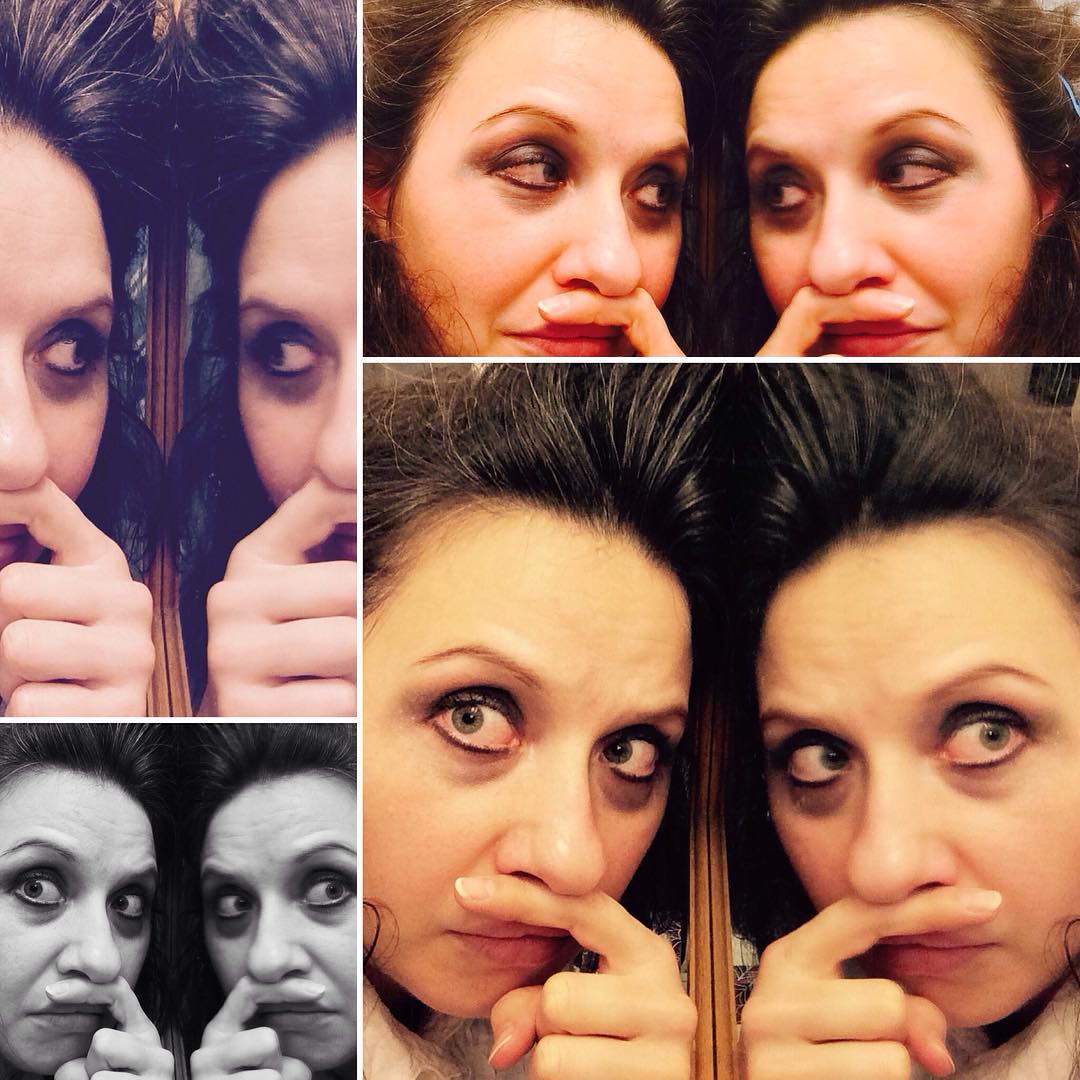
***UPDATE! The Sat 10/24 9:30 show is now FREE for LGBTQ youth and their supporters! No ticket required. Informal meet-and-greet with the cast and creators immediately follows this special performance of TBITB!
A huge OOO Hoorah! goes out to Robin and Paul Cohen, whose generous donation covers our LBGTQ Youth Alliance Show! The gift was made “in memory of Gloria Payne, [OOO Member] Danny Cohen’s grandmother, who loved all things opera, loved to laugh, and would have appreciated the irreverent spirit of One Ounce Opera.”
(OOO is family, y’all. This is so special!)***
Greetings!
As many of you know, One Ounce has been workshopping and rehearsing a world premiere comic operetta titled “There’s Beauty In the Beast (TBITB).” This one-of-a-kind piece for five singing-actors opens this Friday, October 23rd. But it’s Saturday night’s late performance we are really looking forward to…
OOO is thrilled to designate Saturday, October 24th 9:30pm as our LGBTQ Youth Alliance show. This performance will feature an informal talk-back session with the cast and creators. Help us send these young people home laughing…before curfew, of course!
EVERY TWELVE DOLLARS donated to Austin Creative Alliance on our behalf between now and this Saturday will allow one LGBTQ youth — or their supporter or family member — entrance to There’s Beauty In the Beast Saturday night! Anything over will go into the OOO general outreach fund so we may share more opera with more people!
What makes TBITB so special? I sat down with creator Michael Nesline (Esther’s Follies, Gran Fury, et al). Here are his words:
The idea of a comic Frankenstein Opera came to me years ago, when a bunch of us threw a talent show for our own amusement. I was inspired (from who knows where) to write a little ditty for Madame Frankenstein to sing to her husband, of her bewilderment and heartbreak over the utter loss of his love and affection, now showered on the Creature. Â And, bowed but not defeated, she proposes a possible solution.
I realized there might be a potential story to be told, sat down in front of my Mac Classic, wrote a few songs and a silly script, put all of it in a drawer and there it marinated for the next 15 years.
[…]With all the wonderful hubbub swarming around the transgender community, it occurred to me that this seemingly overnight recognition of people heretofore rendered invisible could be the missing linchpin to join the comedy and sincerity of the [TBITB] script, giving depth and meaning to what risked being an otherwise cartoon story.
And that nicely mirrors what’s happening right now in our world, as our society acknowledges and welcomes the transgender community. To the extent we recognize that all of life is a variation on a theme. All our lives are made richer and deeper with meaning, anytime another of us comes out of the shadows, daring to be recognized. And taking to heart the simple truth that in variety is power and pride, joy and delight.
Thanks so very much for your continued support. We look forward to seeing you at the World Premiere of There’s Beauty In the Beast!
Now Hiring! Work With OOO.
NOW HIRING! WORK WITH OOO.
Take us from piano to FORTE! Become a part of the OOO team, and instrumental in a non-traditional arts organization on the forefront of the alt-classical revolution.
We need your special skills. The company is looking for a Development Intern and an Administrative Intern to begin as soon as October. Here are the official postings:
Administrative: http://www.nowplayingaustin.com/classifieds/detail/28254
Development: http://www.nowplayingaustin.com/classifieds/detail/28255
Submit a resume and cover letter here. We cannot wait to meet you!
Three Years, New Dreams, Fresh Site
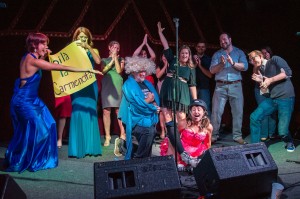 On August 23, 2012, The One Ounce Opera Company was christened during a well-attended launch party at Red 7. Perhaps you were there, or perhaps you are just now discovering OOO. Either way, you are the reason we do what we do, and the reason we are able to do what we do.
On August 23, 2012, The One Ounce Opera Company was christened during a well-attended launch party at Red 7. Perhaps you were there, or perhaps you are just now discovering OOO. Either way, you are the reason we do what we do, and the reason we are able to do what we do.
Thank you.
It's hard to believe almost three years have past. Three years of dreamy collaborations, rewarding work, and personal exploration. Three years humbled by accolades, awards, and attention. Three years of growth. Of friendship. Of music.
Now, the next chapter begins.
With the launch of our re-designed site and our newly-minted status as a sponsored project of the Austin Creative Alliance, the next year will certainly be our biggest and best yet.
Fresh Squeezed Ounce of Opera and Art Song. A Jackass Opera Auction. The Divas and the Emcees. The return of OOO's Highfalutin Holiday. A progressive bicycle opera mystery. An interactive young people's opera. These ambitious projects -- and many more -- will be featured in the coming months.
These projects are designed for you, our curious and eclectic community. They are developed to continue to explore how classical music and culture fit into our ever-changing landscape.
Let's make way for the new around us. Let's re-imagine opera together.
Thank you for making the journey worthwhile,
Julie and the OOO Team
PS: excited by what you hear? Donate today!
PSS: we'll be announcing exclusive ticket pre-sales and member events through our NEWSLETTER. Don't miss out! Sign up now -- add your email in the footer below!
Call for Artists: Listening Garden III
Dear friends,
One Ounce Opera is producing the 3rd annual alt-classical showcase “The Listening Garden” at Clayworks Studio/Gallery on E 6th on Sunday, March 8th from 4-7pm. We are asking accomplished local classical musicians and composers if they would like to come share their latest works pre-SXSW in intimate spaces with a lovely crowd. Beer and wine will be available, and there is a food truck onsite as well. It is a family-friendly, relaxed event (as you know).
The event is “free”; however, donations will be taken (both preceding the event, at the door, and at the beverage table) so we may offer an honorarium for the artists. One Ounce Opera is a newly-sponsored project of the Austin Creative Alliance.
And we will have a harpsichord. 🙂
OK — now, the nitty-gritty “official” details:
Right now, we seek 3-4 additional acts/ensembles for the bill. We are scheduling these 15-30 minute sets between 4:15 and 7pm. There are three performance spaces — a kiln room for larger ensembles, an intimate studio gallery, and a beautiful outdoor garden with a stage. Acts will be rotated between them. Music should be acoustic, although a small amp for balance or an electro track is fine (just no PA).
If you would like to showcase your wares — or know some who might — we are asking to let us know by Monday, 2/16*. If we happen to receive more submissions than we have room, we will accept based on variety and when the submission was received (to be as fair as possible).
All participants will be notified of their time by Wednesday, 2/18.
If you’d like to participate, please send Julie Fiore (julie-at-oneounceopera-dot-com) the following:
1) The name of your ensemble (or your name if performing solo);
2) Your instrument/instruments;
3) Piece(s) you’d like to present (if known — otherwise, a general idea is fine), and the total time of your set;
4) a website (if applicable) for PR and the program, with a short 140 character bio/statement about the ensemble/you (you can send this later if you don’t have time just yet — no problem!);
5) anything else we might need to know, if applicable or if known at this time (equipment specs, if you need a piano or harpsichord, “I am only available from 5-6pm”, inside only, prefer outside, etc.).
Pictures of the venue and more about the newly-renovated space can be found here: http://www.clayworksvenue.com/
Of course, if you are not available, we’d be so grateful if you would be willing to forward this post to anyone who might be interested. We hope to curate a balanced and exciting showcase of music new and old, and hope to have you join us!
Best,
Julie and the OOO Team
*deadline extended! 🙂
[twitter style=”horizontal” float=”left”][fbshare type=”button” width=”100″]
BEERthoven Recital Series - Official Press Release from OOO
“BEERthoven Recital Series” Adds Bowling, One Ounce Opera to Program in Historic Texas Building
Intimate Concert Will Feature Strauss, Brahms, Beethoven…and Beer
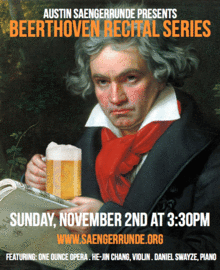 AUSTIN, October 14, 2014 -- One Ounce Opera, an Austin Critics’ Table Award Nominee now in their third season, announces an upcoming performance on Sunday, November 2nd during the new Beerthoven Recital Series, produced by the Austin Saengerrunde and directed by pianist Daniel Swayze.
AUSTIN, October 14, 2014 -- One Ounce Opera, an Austin Critics’ Table Award Nominee now in their third season, announces an upcoming performance on Sunday, November 2nd during the new Beerthoven Recital Series, produced by the Austin Saengerrunde and directed by pianist Daniel Swayze.
This concert series is described as “an intimate, experimental take on house-style concerts” featuring traditional German hors d’oeuvres and libations from Scholz’s while local classical musicians share their performances. The musical focus is on lieder (song) and chamber works from German-speaking composers. As a bonus, recital guests are invited to bowl at the historic Saengerrunde bowling center downstairs following the recital at no additional cost.
"I started working with the Saengerrunde in the Fall of 2013,” says Swayze, “and was delighted in coming to know this group of people that likes to drink beer, make dirty jokes, and celebrate German song. It seemed to me the perfect opportunity to make a unique venue that features local artists, and removes the stuffiness and formality of concert halls.”
OOO’s director Julie Fiore and her group agree. They encourage a new generation of opera lovers through non-traditional venue and program choices, and believe Austin is ripe with innovation.
Fiore says, “Our aim is to re-imagine opera in unexpected places, so why not above this treasure of a bowling alley? Plus, nothing goes better with bowling than beer. Add some German masterpieces to the mix and it’s an eclectic Austin afternoon!”
A special quartet of OOO’s professional vocalists (Cristina Flores, Fiore, Dalton Flake and Michael Holderer) will join Swayze and violinist Hyejin Chang in presenting adapted selections from J. Strauss’ Die Fledermaus. Also featured will be Brahms’ popular Hungarian Dances, and — of course — a few surprises.
“The timing of this concert is deliberate,” says Fiore. “We hope to soak up some of the good international mojo from those in town for Formula 1 that weekend, and show how we go ‘classical’ in Austin.”
Swayze experienced a “near sell-out” in June for the 1st Beerthoven event. “A high turnout will help establish this as a regular series, allowing people to feel more comfortable entering into the spirit of music and sense of community that the Germans describe as ‘Gemütligkeit.’”
The Beerthoven Recital Series will take place on Sunday, November 2nd at the Austin Saengerrunde, located at 1607 San Jacinto in Austin, TX. Showtime is 3:30pm. Ticket price includes Hors d’oeuvres and libations, and post-concert bowling. Purchase online at http://beerthoven.bpt.me/ For more information, contact OOO or visit http://www.saengerrunde.org
Why the Rising Popularity of Soccer in the US is a Good Sign for Opera Fans
Why the Rising Popularity of Soccer in the US is a Good Sign for Opera Fans:
An Examination of Two Imported European Traditions
by Julie Fiore, OOO Founder
I had an unique experience watching the USA v Portugal World Cup match yesterday. I wasn’t at a pub. I wasn’t in a typical bar. The game was hosted by a popular live music club in Downtown Austin called Red 7, transformed into a viewing room with a big screen on the stage. As the match kicked off, the electric crowd resembled one you’d expect at a rock show -- tattooed, pierced musicians applauding beside hip young professionals, and college students cheering alongside 30-somethings who work in the service industry.
 It seemed those in attendance were not only fully-engaged in the action, but somewhat knowledgeable about the players, what the outcome would mean for the victor, and the overall rules of the game. And we weren’t alone: almost 25 million others were locked into the game -- a record for televised soccer in the US by a long-shot.
It seemed those in attendance were not only fully-engaged in the action, but somewhat knowledgeable about the players, what the outcome would mean for the victor, and the overall rules of the game. And we weren’t alone: almost 25 million others were locked into the game -- a record for televised soccer in the US by a long-shot.
All of this for a sport once deemed “boring”, "melodramatic" and “full of softies” by most red-blooded Americans. Or -- if nothing else -- a silly game so steeped in Old World tradition that us Yanks would always feel disconnected.
So today, I wondered -- what could this cultural shift mean for other historically European traditions here at home? Specifically, what could this mean for a resurgence of opera and classical music in the United States?
You can reasonably draw all sorts of parallels between a soccer match and an opera. The drama unfolds slowly, beautifully, accented with moments of intense emotion -- usually joy or pain. You become deeply invested in the movement and development of the story and the characters involved. There is a hero. There is an underdog. There is oftentimes internal conflict between the rising talent and a sunsetting star. There are twists and turns and unexpected results, even if you think you know the story.
Consider the amount of risk involved for the players both physically and emotionally, both on the stage and on the pitch. If these highly-trained professionals do not perform as expected -- if they badly strike a ball or botch a high note -- they could be publicly blasted for having lost their edge. For disappointing fans. For losing the game.
There is a certain amount of musical grace to it all. Ebb and flow, one pass to another, sometimes a chorus moving -- no, crescendoing down the field, and sometimes a lone wolf locked in an intense one-on-one battle with their enemy. The offense and the defense work together seamlessly, much like the instrumentalists and the singers.
So could this renaissance-of-sorts for European Football mean that American audiences are learning to be more patient? More “attuned” to thoughtful, developing action instead of requiring constant high-energy assaults-of-the-senses (the barrage of advertisements, never-ending sounds, and big screens which have become a part of every modern NBA game, or the insanely elaborate light shows and heavily-amplified music at pop concerts)? Can our attention be truly held for longer than the commercial intervals now infamously worked into each NFL game? There certainly are no breaks during a soccer match, nor till intermission at an opera.
If Americans are able to appreciate the athleticism and artistry of soccer players, could the same be true for classical singers? Maybe it means we, as the true mutts of the globe, have re-discovered a bit of our world-wide ancestors’ human connection to the “beautiful game” just as we could -- and should -- to the grandest of all artistic imports: opera.
[twitter style="horizontal" float="left"][twitter_follow username="http://twitter.com/oneounceopera" language="en"] [fbshare type="button"][fblike style="standard" showfaces="false" width="450" verb="like" font="arial"] [google_plusone size="standard" annotation="none" language="English (UK)"]
